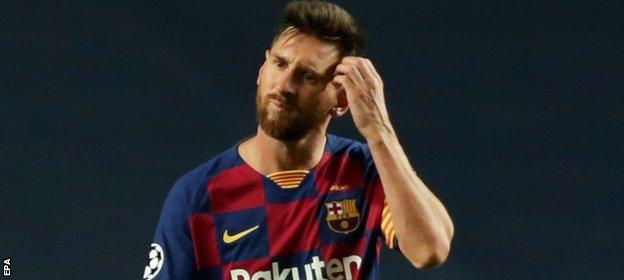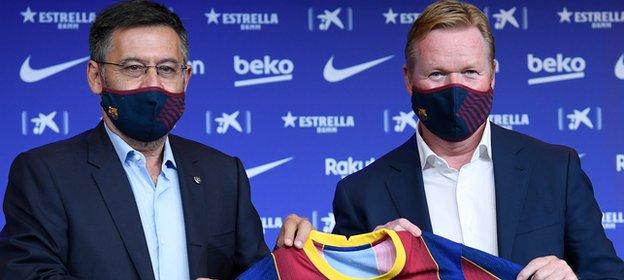Ronald Koeman: Lionel Messi's future on list for Dutchman at Barcelona
Last updated on .From the section European Football

So now it's official. Ronald Koeman is the new coach of Barcelona and Lionel Messi, the Dutchman has said, will be key to his plans.
President Josep Maria Bartomeu has spoken to Messi's dad, who told him Koeman's thinking was fine, but he had to speak to his son.
The club's focus should not, perhaps, be about what Lionel Messi can do for Barcelona but rather what the new Barcelona can do for Lionel Messi.
In the very near future, Koeman, Messi and Bartomeu are going to have to discuss things. Messi, on holiday and totally out of reach to all but his very close circle, is going to need a lot of convincing.
What are Messi's options?
Messi is still spitting feathers after the 8-2 Champions League quarter-final humiliation by Bayern Munich.
He normally won't even speak to his mother after a major defeat, so the chances of him sitting around a table to discuss his immediate future with Bartomeu - one of the men, if not the main one, responsible for the dreadful situation the club finds itself in, and who he wants to see gone - are remote to say the least.
Barca, meanwhile, are reminding everyone his buyout clause is 700m euros (£627.96m).
Bartomeu has privately considered the possibility of Messi leaving, and sees positives. But neither he nor anyone else feels brave enough to take that course. Quite the contrary.
There have been moments in the past when Messi's future at Barcelona has looked uncertain. But, make no mistake about it, he has never been closer to leaving than he is at the moment.
A story arising from what was described as a "dressing-room leak" claimed Messi would leave "now". The club denied they had heard that from him, but know the threat is real. Messi's camp have not admitted as much, but they have not denied it either.

By the time Messi's contract ends next summer, he will have just turned 34.
He will be the first to ask himself if he wants to be the leader of a transition that will probably take a couple of years - during which time Barcelona will not be able to compete at the highest level - or accept one of the many offers that have been out there and could return, most notably from Paris St-Germain and Manchester City.
His options could well be one last hurrah, perhaps reuniting with Neymar - his great friend and the player he enjoyed playing with the most since Ronaldinho - or maybe working once again with Pep Guardiola, unquestionably the coach who helped to make him the player he is today.
The choices facing Barcelona are stark. Persuade Messi to stay, sell him while they can for what they can - although with just 10 months remaining on his contract that buyout clause is the stuff of fantasy - or lose him for nothing in June next year.
Koeman and Ramon Planes, the new sporting director after Eric Abidal decided his voice did not carry enough weight, will attempt to get the Argentine to stay.
If they manage it and also renew the squad, they will deserve all kinds of accolades. It will be not easy.
What has Koeman got to do?
Messi apart, the situation facing Koeman and the Barca board is unerringly simple, although the process could prove tortuously difficult.
About 70% of Barcelona's revenue is being spent on first-team wages, a situation as absurd as it is unsustainable.
At a meeting with selected members of the media at the club on Tuesday, Bartomeu insisted the main problem facing the club was a 'sporting crisis' rather than an institutional one.
That is a moot point from a president who has gone through four coaches and five sporting directors in just six years, leaving Barcelona on the floor, in tatters and without any clear DNA in terms of their football.

Latest out of the door is Abidal, who said earlier this year that certain players had not performed for their then coach Ernesto Valverde.
"Who?" asked Messi, basically calling on Abidal to name names, or shut up.
The relationship between the players and the board broke down at that point and Abidal was once again the man it was most convenient to blame. In reality, he was only doing the board's bidding.
Whether it is a sporting or institutional crisis is something the members will decide when they vote in presidential elections Bartomeu has called for March.
He admitted the problems the club are now facing should have been confronted earlier, probably after the Anfield debacle in May last year, when Liverpool staged their epic Champions League semi-final turnaround.
In reality, it goes back much further - and the warning signs were there when Barcelona were destroyed 4-0 at Paris St-Germain back in February 2017.
The stunning comeback in the second leg temporarily stuck a plaster over the gaping wound. Then there were the hurtful defeats against Roma and Liverpool. There were enough clues.
Who could leave?
On Tuesday, Bartomeu announced a shortlist of those players he considered vital for the regeneration of the new Barcelona, to play alongside an impressive selection coming from the academy who have not all been given their chance.
Marc-Andre Ter Stegen, Nelson Semedo (surprisingly), Messi, Frenkie de Jong, Clement Lenglet, Ousmane Dembele and Antoine Griezmann were the players he named as essential to Barcelona's renaissance.
That, of course, means the players he didn't mention - like Gerard Pique (contracted until June 2022), Sergio Busquets (June 2023), Luis Suarez (June 2021, but with an option to renew for a further year), Jordi Alba (June 2024), Samuel Umtiti (June 2023), Ivan Rakitic (June 2021) and Arturo Vidal (June 2021) - are considered surplus to requirements.
The problem, of course, is no-one is going to be able to afford to keep them in the style to which they have become accustomed, and Busquets, and Alba via his agent, have already made it abundantly clear they aren't going anywhere unless Barcelona would like to pay up the remainder of their contracts. Suarez has used a media outlet to anonymously say the same.
Koeman has been here before and, to be frank, it didn't go well.
Back in 2007, he tried something very similar when at Valencia, telling the likes of Santiago Canizares (299 appearances) , David Albelda (213) and Miguel Angel Angulo (299) they no longer featured in his plans.
It swiftly became a battle between him and the veterans. He lost. Koeman was sacked and replacement interim manager Voro instantly reinstated them into a relegation-threatened side for the remaining five games of the season.
Having said that, he did win Valencia their first Copa del Rey since 1999, then took Southampton to their highest ever Premier League finish (sixth) before joining Everton and taking them into the Europa League in his first season.
Now at Barcelona, what is certain is Koeman and the board desperately need to rid the club of the deadwood (more or less the description Bartomeu gave those players). How's he going to do it? Your guess is as good as mine.
Perhaps most bizarre of all is the fact he has been given a two-year deal, despite the fact he would have been quite happy to sign for one and that he is going to be replaced by club legend Xavi - currently managing in Qatar - after next March's presidential elections, if Bartomeu's chosen candidate does not get elected.
The vast majority of candidates have stated Xavi will be their man of choice if elected, so one of their first jobs will probably be to pay compensation to the outgoing Dutchman.
What are his tactics going to be?
One player who will probably benefit most from the appointment is De Jong, who has played in a much freer role for the Netherlands under Koeman. Under Quique Setien, Barca played a very positional game which went very much against the young Dutchman's natural strengths.
Koeman will certainly look to release his potential, although the way he will play De Jong tells us instantly this side is not going to be the possession-based, positionally concentrated Barcelona that people identify with.
In terms of style, Koeman has never represented that particular footballing ideology, even though he is a huge admirer of former Barca boss Johan Cruyff's 'Total Football'.
Koeman's teams, wherever he has been, tend to be a little bit more traditional, flexible, conservative and even less structured, trying always to adapt to the players and not to an idea, which goes against the original principles of the club.
But who knows any more what Barcelona's DNA is or should be? That is not being debated amid the chaos at the club.
If you want to use Messi to his fullest, all bets are off - he dictates the way the game is played.
The big challenge will be whether Koeman can combine the youthfulness and energy his new team will need with the pace and structure Messi requires around him to make his impact.
We will see what happens. Whether that evolution will involve Messi remains to be seen.























